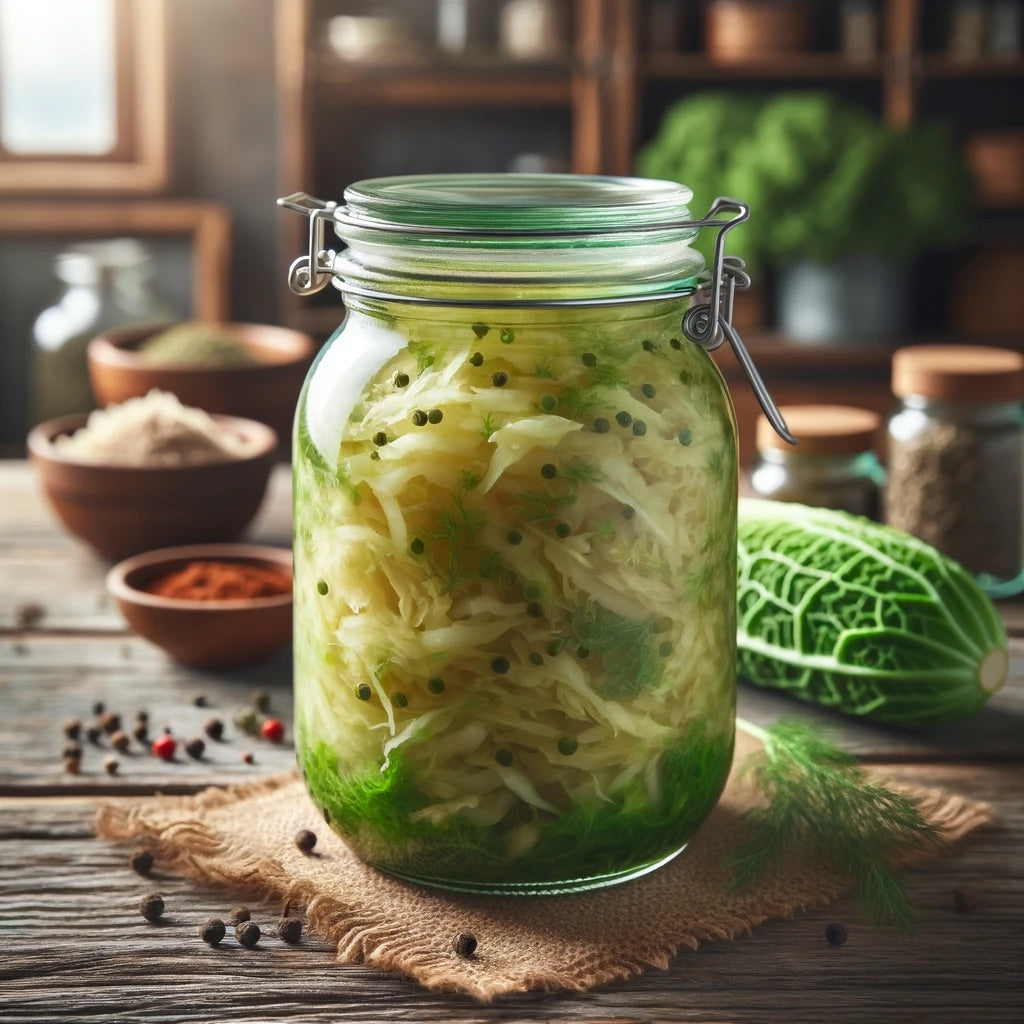
A Gut Healthy Fermented Sauerkraut Recipe
Share
Discover the Health Benefits of Fermented Foods
Fermentation is an ancient culinary tradition that has been practiced across various cultures for thousands of years. This time-honored method not only preserves food but also enhances its nutritional value, making it a staple in many traditional diets. From tangy sauerkraut to spicy kimchi, fermented foods offer a myriad of flavors and health benefits that are worth exploring.
One of the most significant advantages of fermented foods is their positive impact on gut health. Rich in probiotics, these foods help balance the gut microbiome, promoting better digestion and absorption of nutrients. Regular consumption of fermented foods can lead to improved digestive health and a stronger immune system, thanks to the beneficial bacteria they introduce to the gut.

Overall Well-Being and Fermented Foods
In addition to their gut-friendly properties, fermented foods are known for their rich nutrient content. The fermentation process increases the availability of vitamins and minerals, making foods like miso, yogurt, and kombucha not only delicious but also highly nutritious. These foods are also easier to digest, as fermentation breaks down complex nutrients into simpler forms that are readily absorbed by the body.
Incorporating fermented foods into your diet can also have positive effects on your overall well-being. Studies suggest that a healthy gut microbiome is linked to better mental health, reduced inflammation, and even weight management. By enjoying a variety of fermented foods, you can support your body’s natural functions and enjoy the diverse and vibrant flavors they bring to your meals.

Homemade Sauerkraut Recipe
What you'll need:
- 1 medium green cabbage (about 2 pounds)
- 1 tablespoon sea salt or kosher salt (non-iodized)
- 1-2 teaspoons caraway seeds (optional, for added flavor)
Equipment:
- Large mixing bowl
- Cutting board and knife
- 1-quart wide-mouth mason jar with lid
- Clean cloth or paper towel
- Small weight (a smaller jar or a fermenting weight)
How to make it:
-
Prepare the Cabbage:
- Remove any damaged outer leaves of the cabbage.
- Cut the cabbage into quarters and remove the core.
- Slice the cabbage into thin shreds.
-
Salt the Cabbage:
- Place the shredded cabbage in a large mixing bowl.
- Sprinkle the salt over the cabbage.
- Massage the cabbage with your hands for about 5-10 minutes until it becomes soft and releases liquid. The cabbage will reduce in volume and become more pliable.
-
Pack the Jar:
- Add the optional caraway seeds to the cabbage and mix well.
- Pack the cabbage tightly into the mason jar, pressing down firmly with your hands or a tamper to eliminate air pockets.
- Pour any liquid released during the massaging into the jar. The liquid should cover the cabbage entirely. If there isn't enough liquid, you can add a little water to ensure the cabbage is submerged.
-
Weigh Down the Cabbage:
- Place a small weight on top of the cabbage to keep it submerged under the liquid. A smaller jar filled with water or a specialized fermenting weight works well.
- Cover the jar with a clean cloth or paper towel and secure it with a rubber band or the jar's lid (without tightening it fully).
-
Ferment:
- Leave the jar at room temperature, out of direct sunlight, for about 1-4 weeks. The fermentation time can vary depending on the temperature and your taste preference.
- Check the sauerkraut daily to ensure the cabbage remains submerged. Press it down if necessary.
- Taste the sauerkraut after the first week. When it reaches your desired level of tanginess, it's ready to be enjoyed.
-
Store:
- Once fermented to your liking, remove the weight and cover the jar with a regular lid.
- Store the sauerkraut in the refrigerator, where it will keep for several months.

Tips:
- Use non-iodized salt to avoid any interference with the fermentation process.
- Ensure all equipment and your hands are clean to prevent contamination.
- If you notice any mold on the surface, remove it carefully. As long as the cabbage beneath the brine looks and smells good, it is safe to eat.
Embrace the Power of Fermented Foods
Incorporating fermented foods into your daily diet is a simple yet powerful way to enhance your overall health and well-being. The ancient practice of fermentation not only enriches the flavors of your meals but also provides a wealth of probiotics and nutrients that support digestive health, boost immunity, and contribute to better mental and physical health. By exploring and enjoying a variety of fermented foods, from tangy sauerkraut to creamy yogurt, you can reap the numerous benefits they offer while indulging in their unique and delightful flavors. Embrace the power of fermented foods and embark on a journey toward a healthier, more vibrant you.
